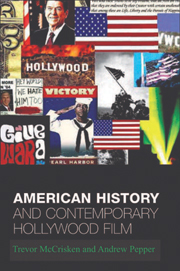Book contents
- Frontmatter
- Contents
- Acknowledgements
- Preface
- Introduction
- 1 Lessons from Hollywood's American Revolution
- 2 Rattling the chains of history: Steven Spielberg's Amistad and ‘telling everyone's story’
- 3 Hollywood's Civil War dilemma: to imagine or unravel the nation?
- 4 Saving the Good War: Hollywood and World War II in the post-Cold War world
- 5 Oliver Stone and the decade of trauma
- 6 From Civil Rights to Black Nationalism: Hollywood v. black America?
- 7 Hollywood's post-Cold War history: the ‘righteousness’ of American interventionism
- Select Bibliography
- Index
7 - Hollywood's post-Cold War history: the ‘righteousness’ of American interventionism
Published online by Cambridge University Press: 05 August 2013
- Frontmatter
- Contents
- Acknowledgements
- Preface
- Introduction
- 1 Lessons from Hollywood's American Revolution
- 2 Rattling the chains of history: Steven Spielberg's Amistad and ‘telling everyone's story’
- 3 Hollywood's Civil War dilemma: to imagine or unravel the nation?
- 4 Saving the Good War: Hollywood and World War II in the post-Cold War world
- 5 Oliver Stone and the decade of trauma
- 6 From Civil Rights to Black Nationalism: Hollywood v. black America?
- 7 Hollywood's post-Cold War history: the ‘righteousness’ of American interventionism
- Select Bibliography
- Index
Summary
In the giddy optimism that accompanied the fall of the Berlin Wall in 1989 and the attendant disintegration of the Cold War, commentators, particularly from the American right, looked to a rose-tinted future in which the United States bestrode the world as its only superpower. Most famously, or notoriously, Francis Fukuyama, then the Deputy Director of the State Department's Policy Planning Staff, argued that the ‘triumph of the West’ was evidenced ‘in the total exhaustion of viable systematic alternatives to Western liberalism’ and that the end of the Cold War marked ‘the end point of mankind's ideological evolution and the universalization of Western liberal democracy as the ultimate form of human government'. Fukuyama's predictions about the hegemonic global dominance of a form of Western liberal democracy coded as American may have come to pass, but the implicit global stability and order that he might have expected to result from such a situation has not materialised. Rather, the post-Cold War era has done much to justify the fears of other commentators who believed the world would be a far more dangerous and unpredictable place following the end of the ideological struggle between East and West. International stability, far from being assured by the unfettered spread of liberal democracy and market capitalism, has been threatened by the forces of ethnic nationalism, religious fundamentalism, international terrorism and other emergent threats to security.
- Type
- Chapter
- Information
- American History and Contemporary Hollywood Film , pp. 187 - 210Publisher: Edinburgh University PressPrint publication year: 2005



